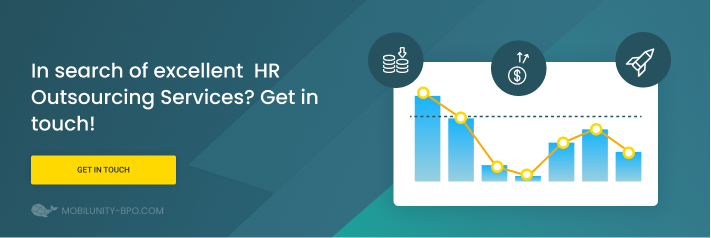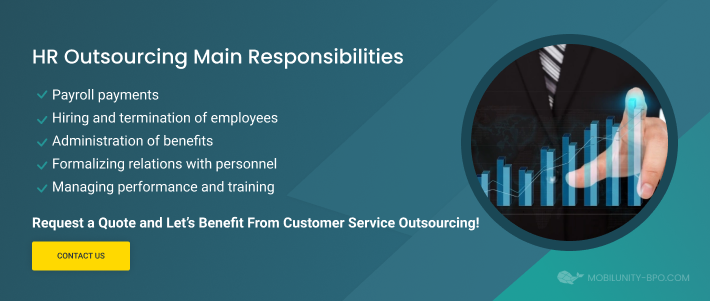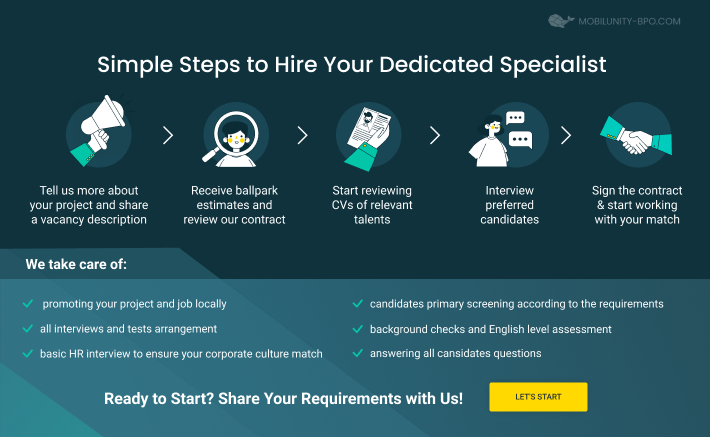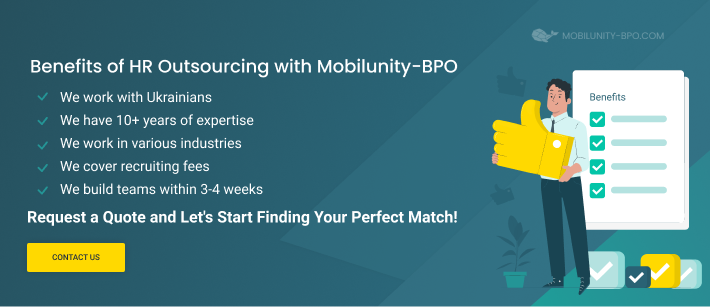Pros and Cons of HR Outsourcing for Any Company
When a business has good staff management and a strong rapport with workers, it’s more successful and profitable. However, payroll payment, bonuses calculation, employee retention, and other HR-related activities require time and effort. And consequently, they demand significant investments. But there are ways to cut costs for an HR department, and one of them is HR outsourcing.
From this article, you’ll learn about the pros and cons of outsourcing HR functions and understand how outsourced HR can help grow your business.
Why HR Outsourcing Is Popular
Like outsourcing other business processes, HR outsourcing assumes delegating one or several HR functions to a professional company. And there are two basic models of hiring a third-party company to fulfill business tasks for you:
- HRO (Human Resource Outsourcing). With the HRO option, your organization keeps your staff’s legal and tax responsibilities. So, while a contracted company runs the administration, you’re the one who keeps managing people. In addition, every employee remains listed on your business books. And as for the volume of delegated assignments, HR outsourcing lets businesses hand over separate tasks or contract out the entire pack of HR services. These are some of the benefits of outsourcing HR.
- PEO (Personal Employer Organization). A PEO provider legally appears as an employer of your workers. So, a company offering PEO services is more like a co-employer for you. It meets all the official requirements for personnel, fulfilling the rising legal and tax obligations. But despite the complete control of the documents, the PEO model assumes that you manage hirings, dismissals, and workforce distribution across your projects.
The HR outsourcing model has gained popularity because it helps owners centralize staff-related activities, cut costs, and focus on core business tasks. You can better balance the managerial and hiring tasks with a third-party provider. Among the duties that you can outsource are:
- Payroll payments. Salary calculations and payouts are the most popular functions to outsource. That’s because accountants need to consider various deductions and accruals, monitor benefits, and prepare tax reports. So, if your HR team can’t effectively embrace all these duties on time, it’s possible to contract out these tasks.
- Hiring and termination of employees. When it comes to headhunting a C-level executive, professional recruiters can do it much faster and more effectively. That’s because these specialists leverage proven approaches and tools to achieve the set goals. So, whether you need to acquire talents or terminate a receptionist, an HR outsourcing provider is a good fit.
- Administration of benefits. Medical insurance and social security are essential for an employee benefits package. With these plans in place, your company can stay competitive in the labor market. But complying with regulations isn’t easy as your managers need to monitor official requirements and meet them constantly.
- Formalizing relations with personnel. Working on internal policies is hard work as your HR team has to look after the interests of both sides. Crafting employee handbooks, creating corporate politics, mediating conflicts, and incorporating retention initiatives are only some of the outsourcing tasks.
- Managing performance and training. Keeping your personnel’s competence at a high level is vital for your company’s success. So, revealing the talents of your team and helping them improve their skills and abilities is critical. And assessing quarter and annual results is the key practice for growing the expertise and salaries of your workers.
And now, let’s check the pros and cons of outsourcing HR, so you can get a better idea if this format suits your business needs.
Benefits of Outsourcing HR
Let’s start from what you get by switching to the new format of HR services. Among the advantages of outsourcing HR functions are:
- You cut operational costs. Once you change your in-house HR team to an outsourced one, you decrease payrolls, office rent, and equipment costs. And depending on the provider, you can save up to 20% of your regular expenses, which means that you can invest those funds into developing your business.
- You concentrate on revenue-generating processes. HR-related tasks require time, whether you’re a start-up or a seasoned organization. But once you delegate them to experts, you can devote more time to the core activity that brings in revenues. So, you won’t have to worry about how to find a couple of hours for calculations or submitting tax reports to authorities.
- Your employees become more loyal. With a professional HR approach and decent insurance package, your personnel will become more satisfied. And employees who feel that managers value their input become much more productive, creative, and loyal to your company. This way, business processes run smoother, faster, and more effectively. And imagine that each team member turns into your collaborator.
- You access top-notch HR professionals. By contracting a dedicated HR team that employs advanced methods and top instruments for running human resource activities, you incorporate best practices in your company. These principles and approaches create a motivating atmosphere where each worker feels appreciated. This way, your staff becomes a team that supports each other.
- You get 100% compliant service. Keeping HR activities compliant with governmental requirements is also among the benefits of outsourcing HR. That’s because it’s a prerogative for professional HR service providers. So, by hiring a team of experts in human resources, you can rest assured that they fulfill all the official obligations. All salaries and social contributions will be calculated correctly and paid to relevant accounts on time.
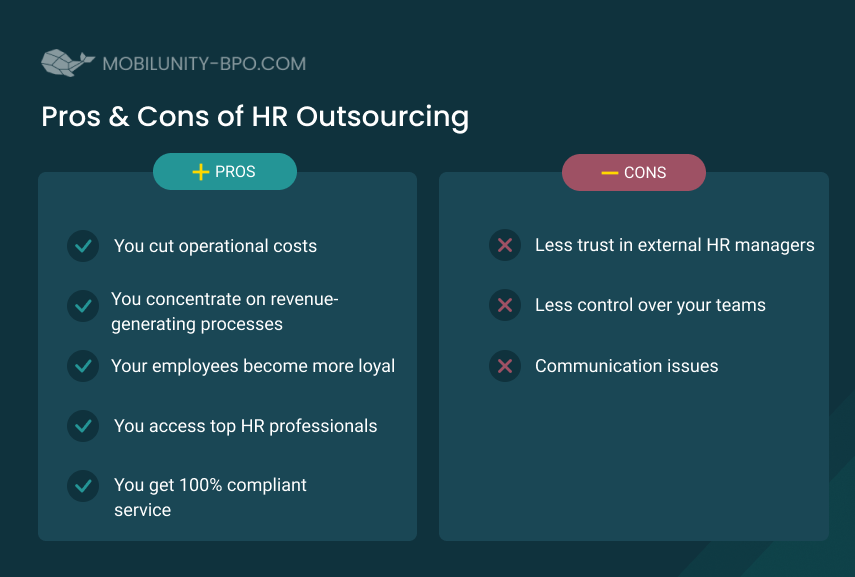
Disadvantages of HR Outsourcing
Though HR outsourcing has an impressive list of pros; it still has several cons that you need to keep in mind.
- Less trust in external HR managers. When people join a company, they expect to communicate with its representatives. And, of course, when they need to interact with third-party managers, this can become frustrating. That’s because we don’t like sharing personal information like job satisfaction or performance data with someone we don’t trust. So, you’ll need to meet your team with new HR managers and stay involved in their communication.
- Less control over your teams. If you’re a startup founder who personally monitors all business processes, it can be challenging for you to delegate personnel-related tasks to external managers. At first, it seems that you’ll lack control over your teams. But in reality, outsourcing assumes the same level of control. So, if you want to stay involved in your team’s experiences, it’s totally up to you.
- Communication issues. Outsourcing HR teams assume that your employees will communicate to new human resource representatives. And though we all got used to working and contacting each other remotely, someone still prefers to discuss sensitive issues in person. For example, these people can leave emails unanswered for days and miss phone calls from external managers because they procrastinate on important talk.
Though this list includes disadvantages of outsourcing HR, these are only several possible scenarios that you can face. And, once you know them, it will be easier to avoid or mitigate their negative impact on your team.
Pros and Cons of HR Outsourcing
Have you got confused by all the factors we’ve discussed? Read on to make it clear! Below, you’ll find the breakdown of HR outsourcing advantages and disadvantages. This table will help you see the key points of this article and let you consider if the outsourcing format meets your business needs.
| Pros | Cons |
| You can save up to 20% of your current costs due to optimizing expenses with HR outsourcing. | Third-party HR managers may fail to build rapport with your employees because they don’t trust external managers. |
| You get more time to focus on essential business tasks and stop concentrating on critical HR activities. | You can experience less control over your teams as outsourced managers communicate with them more often than you. |
| Your employees feel valued, start working more effectively and become loyal to the company. | Knowing that someone takes care of the staff can minimize communication between the business owner and employees. |
| Delegating key business tasks to HR experts will help you create a motivating and friendly environment inside your company. | |
| You won’t have to monitor relevant laws and rules to keep your documents and records compliant – a team of experts will do that for you. |
As you can see, delegating HR tasks to a provider has several strong points. But despite the HR outsourcing trends, each business owner needs to assess if outsourcing HR pros and cons are properly balanced. In other words, you’ll have to calculate whether your savings are worth switching to the new model. And below, we share how companies can cut costs when contracting out HR functions.
How HR Outsourcing Can Help Your Business Save
Cutting costs is one of the main conditions of your company’s success. And many businesses consider HR outsourcing a cost-effective alternative to hiring an in-house team. So, let’s now take a step toward exploring outsourcing HR functions pros and cons in more detail and see how exactly this model can lower costs.
- You won’t have to pay for rentals. While we take on all the issues related to your HR team, you can forget about keeping an office and paying utility bills. We include renting a workplace for each employee, but in Ukraine, these amounts are much lower than in the US or Europe.
- You’ll save on payrolls. We hire HR professionals from Ukraine. And the cost of living there is significantly lower than in Western Europe or America. So, for you, this means cutting salary costs up to 10-20%. In addition, we charge only for hours worked by your team and cover recruiting expenses.
- You won’t have to bear employee turnovers. With HR outsourcing, you eliminate the risk in case your HR team member decides to quit. The outsourcing contract assumes that you pay for HR services, and finding the people to do the job is our responsibility. Moreover, your new HR department will do its best to minimize workforce turnover.
Transitioning from In-House HR to Outsourcing Human Resource Functions: A Strategic Guide
As businesses grow and evolve, the demands of managing human resources become increasingly complex. Many organizations reach a point where they must consider transitioning from handling HR functions in-house to outsourcing HR services. This shift presents a unique set of opportunities and challenges. In this article, we will explore the key considerations and steps involved in transitioning from doing HR on your own to outsourcing human resource functions. By understanding the advantages and disadvantages of outsourcing HR, businesses can make an informed decision and ensure a smooth transition. Before making the decision to outsource human resources, it is crucial for organizations to carefully evaluate the outsourcing human resources pros and cons to determine the best approach for their specific needs and circumstances.
- Assessing the Need for Outsourcing HR. Before embarking on the transition to outsourced HR functions, it is important to assess the specific needs of your organization. Determine the size of your workforce, evaluate the HR workload, and consider the regulatory compliance requirements that impact your industry. By assessing these factors, you can gain clarity on whether outsourcing HR is the right strategic move for your organization.
- Analyzing the Pros and Cons of Outsourcing HR. It is crucial to conduct a thorough analysis of the advantages and disadvantages of outsourcing HR functions. The pros of outsourcing human resources include potential cost savings, access to specialized expertise, scalability, and increased operational efficiency. However, it is equally important to consider the cons, such as the potential loss of control, communication challenges, and data security concerns. Evaluating these pros and cons will enable you to make an informed decision that aligns with your organization’s goals.
- Defining the Scope of Outsourcing. To ensure a smooth transition, it is essential to clearly define the scope of outsourcing HR functions. Identify the specific HR functions you plan to delegate to the external service provider. This could encompass areas such as payroll administration, benefits management, recruitment, onboarding, training, and compliance. By clearly defining the scope, you can effectively communicate expectations and streamline the transition process.
- Selecting the Right HR Service Provider. Choosing the right HR service provider is a critical step in the transition process. Consider providers with a proven track record, relevant industry experience, and a comprehensive range of HR services. Evaluate their expertise, reputation, scalability, data security measures, and cultural fit. Thorough due diligence and gathering references will help ensure a reliable partnership that meets your organization’s needs.
- Communication and Collaboration. When considering outsourcing human resources functions, it is essential for businesses to weigh the outsourcing human resources functions pros and cons to make an informed decision that aligns with their strategic goals and organizational requirements. Effective communication and collaboration are key during the transition process. Establish open lines of communication with the outsourced HR service provider and clearly articulate your organization’s goals, expectations, and cultural values. Regular meetings and reporting mechanisms will foster a seamless transition and ongoing collaboration.
- Data Security and Confidentiality. Outsourcing HR functions involves sharing sensitive employee data with the service provider. Implement robust data security measures to protect employee information and ensure compliance with data protection regulations. Establish confidentiality agreements and conduct regular audits to safeguard data and maintain confidentiality.
- Change Management and Employee Engagement. Transitioning from in-house HR to outsourcing can create concerns among employees. Implement a change management strategy that includes clear communication, employee training, and engagement initiatives. Keep employees informed about the transition process, address their concerns, and emphasize the benefits of the change for both the organization and individual employees. Businesses contemplating the outsourcing of HR services must thoroughly examine the outsourcing HR services pros and cons in order to assess the potential benefits and drawbacks associated with this strategic decision.
Transitioning from in-house HR to outsourcing HR functions can be a strategic move for organizations seeking to enhance efficiency, access specialized expertise, and focus on core business activities. When evaluating whether to outsource payroll services, it is essential to consider the advantages and disadvantages of outsourcing payroll services, which include cost savings, increased accuracy, and reduced administrative burden, alongside potential challenges in maintaining data security and ensuring seamless integration with internal systems.
Benefits of HR Outsourcing with Mobilunity-BPO
Have you decided to opt-in for Human Resources BPO (Business Process Outsourcing)? Then it’s time to look for a reliable provider!
- We work with Ukrainians. Ukraine-based HR specialists boast top expertise and understand business goals. Moreover, they’re flexible, hard-working, and open to communication. And above all that, their average salaries are budget-friendly. Mobilunity-BPO helps you meet with your ideal HR team.
- We have 10+ years of expertise. So, the quality of our work has been acknowledged by 40+ clients. And many of them keep cooperating with us. We’ve found dedicated teams for companies from 15+ countries during our work, and this number will only grow. So, our services are reliable and professional.
- We work in various industries. We’re happy to have 200+ employees on board because these people help us embrace many industries. They include customer support, HR, marketing, back office, data annotation, and others. So, we can equip your business with a dedicated team and help you balance the workload.
- We cover recruiting fees. We enjoy watching how teams that we assemble help you grow revenues. And according to our approach, we don’t charge customers for recruiting. So, creating catchy job descriptions, interviewing candidates, adding recommendations to the best-fit CVs, etc., won’t cost you anything.
- We build teams within 3-4 weeks. We understand that our clients need their HR and other teams asap. So, we’ve streamlined our recruiting process to make it effective and fast. This allows our managers to deliver the first list of candidates within 1-2 weeks and send the job offer in weeks 3-4. However, sometimes it can take longer.
Wrapping Up
Outsourcing HR functions has significant benefits. Among them are lower costs, effective performance management, comprehensive benefit packages, etc. But you need to research the reliable provider carefully. And, of course, consider all the pluses and minuses of outsourcing HR tasks well in advance.
